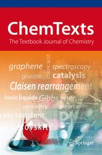
ChemTexts
metrics 2024
Innovating Insights for a Sustainable Chemical Future.
Introduction
ChemTexts is a prominent peer-reviewed journal published by SPRINGER that has been making significant contributions to the field of chemistry since its inception in 2015. With an ISSN of 2199-3793, it focuses on disseminating innovative research and developments in the discipline, particularly within biochemistry and miscellaneous chemistry categories, where it currently holds Q3 and Q2 rankings respectively for 2023. Based in Switzerland, this journal aims to bridge the gap between theoretical insights and practical applications, providing researchers, professionals, and students access to comprehensive studies and discussions that drive the field forward. Although it operates under a traditional subscription model, its commitment to high-quality, impactful research is reflected in its reputation and widespread academic recognition. Whether you are looking to explore groundbreaking chemistry concepts or keep abreast of the latest findings, ChemTexts is an essential resource for fostering scientific knowledge and collaboration within the international research community.
Metrics 2024
 0.49
0.49 2.90
2.90 3.30
3.30 21
21Metrics History
Rank 2024
IF (Web Of Science)
JCI (Web Of Science)
Quartile History
Similar Journals
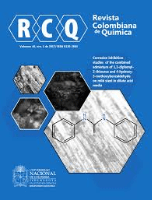
Revista Colombiana de Quimica
Catalyzing Innovation in Chemistry Since 1971.Revista Colombiana de Quimica, published by the Universidad Nacional de Colombia, Departamento de Química, is a distinguished open access journal that has been serving the chemistry community since 1971. With an ISSN of 0120-2804 and an E-ISSN of 2357-3791, this journal presents a platform for researchers, professionals, and students to share and disseminate their findings in the field of chemical sciences. Positioned in the Q4 quartile in the 2023 rankings, this journal focuses on a diverse spectrum of topics within general chemistry, cultivating a rich discourse among scholars and practitioners in Colombia and beyond. Although the journal currently ranks 294 out of 408 in the field, its commitment to open access research ensures that valuable scientific knowledge is accessible to a wider audience, thus facilitating collaboration and advancement in the chemical sciences. As it converges from 2008 to 2022, the Revista Colombiana de Quimica remains a vital resource for anyone looking to contribute to or stay abreast of developments in chemistry.

Studia Universitatis Babes-Bolyai Chemia
A Platform for Emerging Voices in ChemistryStudia Universitatis Babes-Bolyai Chemia, published by UNIV BABES-BOLYAI in Romania, serves as a pivotal platform for the dissemination of innovative research in the field of chemistry. With an ISSN of 1224-7154, this journal has been actively publishing since 2009 and aims to foster scientific collaboration and knowledge sharing among researchers, professionals, and students alike. Although currently categorized in Q4 of the Chemistry (miscellaneous) field, the journal provides an essential venue for emerging studies that contribute to the diverse landscape of chemical research. With its commitment to accessibility and scholarly discourse, Studia Universitatis Babes-Bolyai Chemia remains an important resource for those seeking to stay abreast of the latest developments and trends in general chemistry, holding a Scopus rank within the lower quartiles. Researchers and practitioners are encouraged to engage with its content to enrich their own work and to aid in the advancement of the scientific community.

Foundations of Chemistry
Advancing the Foundations of Chemical KnowledgeFoundations of Chemistry is a pioneering journal published by Springer, aimed at advancing the understanding of fundamental concepts in the field of chemistry from both historical and contemporary perspectives. With the ISSN 1386-4238 and E-ISSN 1572-8463, the journal covers diverse topics within general chemistry, biochemistry, and the philosophical underpinnings of the chemical sciences. Though its availability in Scopus has been discontinued following a converged publication period from 2005 to 2016, the journal remains notable for its high ranking in the Arts and Humanities, where it holds the 60th position in a competitive field, as well as its stable yet modest presence in general chemistry and biochemistry categories. This journal serves not only researchers and professionals but also students seeking an in-depth understanding of the evolution and foundation of chemical knowledge, making it an essential resource for anyone engaged in these disciplines. Readers can expect rigorous scholarship that fosters a deeper appreciation for the intricate connections within chemistry and its historical context.

Chemija
Bridging Disciplines, Transforming Chemistry.Chemija is a prominent journal in the field of chemistry, published by LIETUVOS MOKSLU AKAD LEIDYKLA in Lithuania. With a focus on diverse topics within the realm of chemistry, this journal aims to disseminate original research articles, reviews, and discussions that advance the understanding and application of chemical science. Although it currently holds a Q4 ranking in the miscellaneous category of chemistry, Chemija is committed to elevating its impact through the publication of high-quality research, making significant contributions to the discipline. The journal operates under a non-open access model, ensuring that articles undergo rigorous peer review to uphold academic standards. Researchers, professionals, and students are encouraged to explore the wealth of knowledge within its pages as it endeavors to bridge gaps across various subfields of chemistry from 2008 to 2024. With a dedicated readership and a growing database of insightful publications, Chemija serves as an essential resource in the ever-evolving landscape of chemical research.
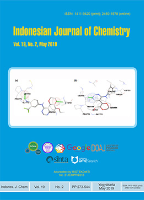
Indonesian Journal of Chemistry
Elevating Standards: Quality Research for a Sustainable FutureIndonesian Journal of Chemistry (ISSN: 1411-9420), published by Gadjah Mada University, Department of Chemistry, is a premier platform for disseminating innovative research and advancements in the field of chemistry. Established as an Open Access journal since 2001, it promotes wide accessibility to high-quality scholarly articles, fostering collaboration and knowledge-sharing among researchers, professionals, and students in Indonesia and beyond. With an impact factor that places it in Q3 among miscellaneous chemistry journals and a Scopus ranking reflecting its emerging influence (Rank #248/408, 39th Percentile), the journal plays a significant role in enhancing the academic landscape of chemistry. Spanning diverse themes within the discipline, it invites contributions that bridge theoretical and practical aspects, thus contributing to the global conversation on chemical research and innovation. Located in Yogyakarta, Indonesia, the journal reflects a commitment to advancing scientific inquiry while addressing local and global challenges in chemistry.

JACS Au
Elevating chemistry research with open access insights.JACS Au, published by the American Chemical Society, is a premier open access journal dedicated to advancing research in the rapidly evolving fields of analytical chemistry, organic chemistry, and theoretical chemistry. Since its inception in 2021, JACS Au has quickly established itself as a leading platform for high-quality research, reflected in its Q1 rankings across multiple categories for 2023, including Organic Chemistry and Analytical Chemistry. The journal focuses on innovative methodologies and applications that drive the discipline forward, making it an essential resource for researchers, professionals, and students alike. With an impressive Scopus ranking, consistently placing in the top tiers of its categories, and offering a broad range of access options for its readership, JACS Au aims to foster collaboration and disseminate transformative ideas that impact the global scientific community. Exploring diverse topics within chemistry, this journal provides a vital conduit for sharing groundbreaking research and enhancing scientific dialogue.
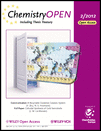
ChemistryOpen
Fostering Collaboration in ChemistryChemistryOpen is a leading open access journal published by WILEY-V C H VERLAG GMBH, dedicated to advancing the field of chemistry. With its ISSN 2191-1363, this journal has been a vital platform since its inception in 2012, promoting unrestricted access to innovative research findings and critical reviews in various chemistry domains. As a testament to its growing influence, ChemistryOpen has achieved a commendable Q2 quartile ranking in the 2023 Chemistry (miscellaneous) category, which highlights its quality and impact within the academic community. Researchers, professionals, and students benefit from the journal's commitment to making high-quality research accessible, facilitating knowledge transfer and collaborative insights among chemists worldwide. The journal's transparent open access model ensures that groundbreaking discoveries and methodologies are readily disseminated, fostering a culture of innovation and interdisciplinary dialogue in the ever-evolving landscape of chemistry.
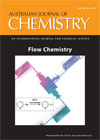
AUSTRALIAN JOURNAL OF CHEMISTRY
Pioneering discoveries in diverse chemical disciplines.The Australian Journal of Chemistry, with an ISSN of 0004-9425 and an E-ISSN of 1445-0038, is a distinguished publication from CSIRO PUBLISHING, dedicated to advancing the field of chemistry since its inception in 1948. Based in Australia, this journal serves as a platform for original research articles, reviews, and innovative studies that encompass a wide spectrum of chemical disciplines, aiming to foster communication and collaboration among researchers globally. Despite its Q3 ranking in the Chemistry (Miscellaneous) category and standing at rank #236 in Scopus’ general chemistry classification, it remains an essential resource for professionals and students seeking to stay informed about emerging trends and discoveries in chemistry. The journal does not offer open access, emphasizing the premium quality of peer-reviewed content that adheres to rigorous academic standards. By bridging theory and practice, the Australian Journal of Chemistry continues to play a crucial role in shaping the future of chemical sciences.
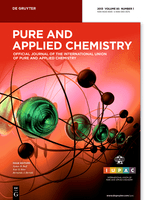
PURE AND APPLIED CHEMISTRY
Fostering Excellence in Pure and Applied ChemistryPURE AND APPLIED CHEMISTRY is a highly regarded journal in the fields of chemical engineering and general chemistry, published by Walter de Gruyter GmbH. Since its inception in 1960, this journal has continued to foster advancements in chemical research and facilitate the dissemination of new knowledge through its rigorous peer-reviewed articles. With an impressive impact factor that places it in Q2 quartile rankings for both Chemical Engineering and Chemistry as of 2023, it holds a significant position in the academic landscape, attracting authors and contributors from around the globe. The journal’s unique focus on the practical applications of chemical research makes it indispensable for researchers, professionals, and students aiming to bridge theoretical knowledge with real-world applications. Although it is not open access, its impact is enhanced by its continued relevance and contributions to the ever-evolving field of chemistry. Researchers and practitioners alike will find in PURE AND APPLIED CHEMISTRY a critical resource for staying updated on key developments and innovative practices in chemistry and chemical engineering.
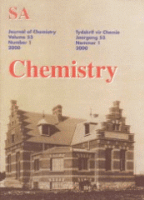
SOUTH AFRICAN JOURNAL OF CHEMISTRY-SUID-AFRIKAANSE TYDSKRIF VIR CHEMIE
Catalyzing Change in the World of ChemistrySouth African Journal of Chemistry (Suid-Afrikaanse Tydskrif vir Chemie), published by Bureau Scientific Publications, is a pivotal open-access journal that has been disseminating groundbreaking research in the field of chemistry since its inception in 1996. With an ISSN of 0379-4350 and an E-ISSN of 1996-840X, this journal serves as a vital platform for researchers and professionals seeking to share their work and engage with the global chemistry community. Recognized for its significant contributions, the journal holds a Q3 quartile ranking in the miscellaneous chemistry category as of 2023 and ranks #216 out of 408 in General Chemistry according to Scopus. The South African Journal of Chemistry is dedicated to advancing knowledge in the discipline by publishing a wide array of articles, reviews, and studies that address pertinent chemical research and applications. With open access options available since 2000, it fosters a collaborative environment, ensuring that research is accessible to all, thereby enhancing the visibility and impact of chemists' work across South Africa and beyond.